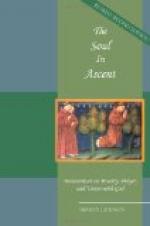Let me make my exact purpose as plain as I can by an illustration. A dear friend, one with whom you have associated for years, enters the silent life. The morning following, as has long been your custom, you offer your prayers to the Heavenly Father, and, as usual, mention that friend by name. Suddenly you stop and say to yourself, “I can no more offer that petition, for my friend is now beyond the need of my poor prayers.” Then, suddenly and swiftly, come the questions, Although my friend is called dead is he any less alive than when he was in the body? Will not all that constituted his personality continue to grow in the future as in the past? Does the death of the body do anything more than change the mode of the spirit’s existence? And the result is that you say to yourself, “I will continue to pray for my friend, for, if he is alive now, every reason which led to prayers before his death justifies their continuance.”
From more than one person I have heard words similar to these which I have put into this hypothetical form; and because of these expressions of sane and sacred experience I am led to ask my readers to follow me in the consideration of a subject which is seldom mentioned, except with incredulity, by most Protestants.
No one who may not appreciate the importance of this subject should be either troubled or heedless. We learn our lessons concerning the profounder mysteries simply by living. No one can be blamed for not appreciating what he is not yet, either intellectually or spiritually, ready to receive. Providence takes good care of us. When we are prepared for the reception of any truth it usually finds us.
This subject has been regarded with suspicion by two classes of thinkers: Protestants who have revolted from the extent to which praying for the dead has been carried in the Roman Catholic Church, and the much smaller number who hold what they delight in affirming is “the true theology,” and who have insisted that when men die their state is irrevocably and forever fixed, the good going at once into the perfect bliss of heaven and the wicked into the suffering of hell.
It will be more profitable for us to deal with the positive side of our subject than to attempt to clear away misconceptions and half truths.
What is meant by prayers for the dead? Exactly the same as prayers for those in the body. When the body dies the soul, or the essential man, is not touched by death. The personality is that which thinks, chooses, lives. Your mother is not the form on which your eyes rested, or the arms which encircled you, but the thought, the devotion, the affection concealed, yet revealed, by the body, and which use it for their instrument. In reality we never saw our dearest friends; what we saw was color, form, but never the spirit. That is disclosed through the body, but is not identified with it. Now just as we have prayed for a mother, or a child, or a friend whose physical form is familiar, but whose personality we have seen only in its revelations, so we continue to pray for that loved one which we do not see any more, or any less, after what is called death.




